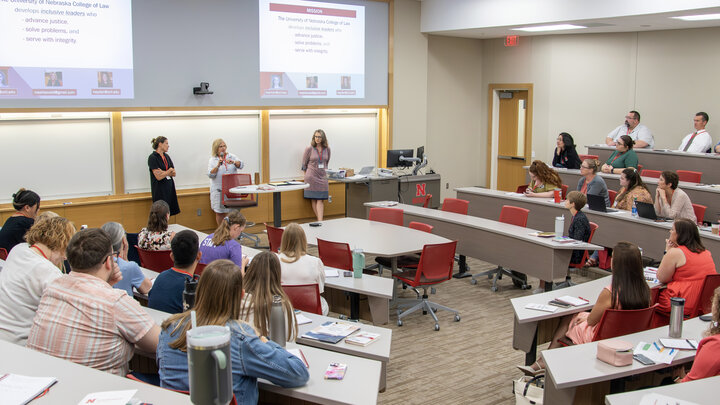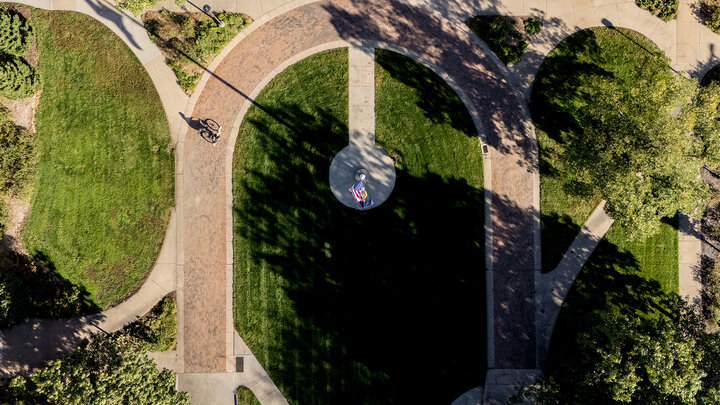Dr. Don Clifton, named the "Father of Strengths Psychology" by the American Psychological Association, had a deep connection to the University of Nebraska as an alumnus and psychology professor. It was here that he conducted his groundbreaking research on human strengths and positive psychology.
The story goes that Dr. Clifton was in Love Library looking down row after row of books on psychology and noticed that all the books focused on identifying what was wrong with people so they could be "fixed." It was then that he had this thought: "What would happen if we studied what is right with people instead of fixing what is wrong with them?"
This question became the foundation of strengths-based psychology, shifting the focus from weaknesses and deficiencies to developing natural talents. His research was the basis for the creation of the CliftonStrengths assessment, which was released in 1999.
Nebraska Law has provided strengths programming for students for nearly a decade as a way to explore and invest in talents. In addition to the five certified strengths coaches on staff, training for administrators and staff has built the College's capacity for providing students with guided conversations that help them understand how their unique talents can impact their work, leadership style, and life.
Investing in Student Strengths
As an initial introduction, students are given access to the CliftonStrengths assessment (Top 5) prior to orientation. During orientation, they participate in an introduction to strengths program and discuss their individual results in small groups.
Students interact with strengths in other ways throughout their first year of law school as well. Professor Chelsi Hayden, one of the College's strengths coaches and author of "Cultivating Natural Talent To Develop Inclusive Leaders," has incorporated strengths into the pedagogy for the first-year Legal Writing, Analysis, Writing and Research course. In addition, at the beginning of the second semester, every first-year student meets with a strengths coach or advocate to reflect on their first semester in law school and how their natural talents have led them to success.
As students progress through their law school career, strengths informs many of their interactions. Academic and career counselors may use strengths to guide students as they make decisions about courses to take or opportunities to pursue. Some of our legal clinics have also made strengths training a regular part of their onboarding programs, and employers that participate in on-campus interviews may use strengths as a conversation tool during recruitment.
Investing in Staff Strengths
Nebraska Law's staff, faculty and administrators also lean into the strengths culture. Each has had the opportunity to discover their own strengths (Full 34), including a one-on-one coaching session with a certified coach. Strengths-based language is used day-to-day and strengths-based opportunities are available to faculty and staff, including:
- Many staff members have participated in team coaching sessions or "Power of Two" meetings with their supervisors. As part of professional development, teams often use strengths-based practices to identify the ways in which colleagues work best and how to maximize each team member's talents.
- The Strengths Advocates Course offered to faculty and staff includes highlights of the official certification course and provides a strong foundation for understanding strengths. To date, more than 40 members of the Nebraska Law community have received this training, including several who participated in an advanced training earlier this year.
- For the past several years, strengths have been incorporated in staff evaluations. This shift has helped staff see how they fit within the team while celebrating their success. Supervisors may suggest ways to better utilize certain strengths in each scenario or share how they've seen a person's strengths shine.
- Recently, strengths were also used in a less traditional professional development situation. As one team looked to generate greater awareness for their program, strengths were used as a component of training on networking and working a room. This approach helped every member of the team identify ways they could best interact with others.
The Impact of Strengths at Nebraska Law
The College of Law's investment in strengths-based development has created a culture where students, faculty and staff recognize and leverage their natural talents. This approach has enriched the educational experience, improved workplace satisfaction, and strengthened the sense of community.
As legal education evolves, Nebraska Law remains dedicated to developing inclusive leaders by focusing on the whole person - not just academic ability, but the unique strengths each individual brings. By helping students and staff identify and use their strengths, the college prepares them for success in law school and for fulfilling careers where they can thrive by doing what they do best.




